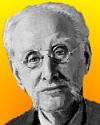
On 31 May 1845, Rookes Evelyn Bell Crompton was born, a British engineer and inventor who as a young man made a steam road engine (1860) and worked on other steam road haulage projects. His interests then turned to electric lighting. Crompton began by importing arc lamps, then started ones of his own improved design. His career expanded to pioneering more widely in the electrical industry, with his Crompton Company. By 1883, he had provided public lighting for large buildings, markets and railway stations. His company expanded, making domestic electric appliances (such as for heating and cooking).
When the Biography of Rookes Evelyn Bell Crompton appeared in The Electrician (1884), a few months before his 40th birthday, he already had a remarkable life of accomplishment... and he had a lot more ahead of him.

On 31 May 1845, Rookes Evelyn Bell Crompton was born, who was a pioneer in the fledgling British electrical industry. Today's book pick is: , by , who explores the electric revolution. Rookes Crompton lit Henley Regatta in 1879, and installed arc lamps at St. Enoch’s station in Glasgow, presaging the the replacement of gas with electricity for lighting. But Crompton is only one of the many innovators in the history of dramatic changes that the author covers in this book.
There followed the electrification of the tramways and the London Underground, the transformation of the home with “labour saving” devices and the vital modernising of industry during two world wars. As early as the 1930s, the first pylons marched across the countryside, causing the continuing battles between environmentalists and the promoters of electric power.
It is available from Amazon, typically about (As of earlier time of writing - subject to change.)
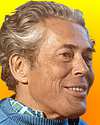 | Armed with all the powers, enjoying all the wealth they owe to science, our societies are still trying to practice and to teach systems of values already destroyed at the roots by that very science. Man knows at last that he is alone in the indifferent immensity of the universe, whence which he has emerged by chance. His duty, like his fate, is written nowhere. |
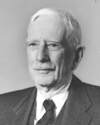 | In time, manufacturing will to a great extent follow the sun. [Speculating that with development of solar power the deserts would become great industrial areas.] |
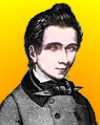 | Unfortunately what is little recognized is that the most worthwhile scientific books are those in which the author clearly indicates what he does not know; for an author most hurts his readers by concealing difficulties. |
| Before you look at today's web page, see if you can answer some of these questions about the events that happened on this day. Some of the names are very familiar. Others will likely stump you. Tickle your curiosity with these questions, then check your answers on today's web page. | |
| Births | |
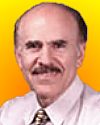 | American pharmacologist, Louis J. Ignarro, was born on 31 May 1941. He shared a 1998 Nobel Prize for the discovery that a molecule as simple as just two atoms, acts as a signaling molecule in the cardiovascular system. This revealed an entirely new mechanism by which blood vessels in the body relax and widen. At first, major professional journals refused to publish his contention that a substance that is basic to nitroglycerin and part of the chemistry of smog is also crucial to the life process. In time, others repeated his work and confirmed his discovery that this molecule is a neurotransmitter. It is, says Ignarro, “perhaps the most widespread signaling molecule” that communicates between various different cell types. What is this molecule? |
 | Charles Greeley Abbot, born 31 May 1872, was an American astrophysicist who studied the radiation of the Sun. As director of the Smithsonian Astrophysical Observatory, he established a network of solar radiation observatories around the world. Beginning in May 1905 and continuing over decades, his studies of solar radiation led him to discover, in 1953, an interesting feature of the behaviour of the radiation. From this decades-long study, what significant discovery did he make about the sun's radiation? |
| Deaths | |
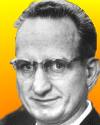 | Leo James Rainwater (1917-1986) was an American physicist who shared the 1975 Nobel Prize for Physics for his part in studying certain atomic nuclei. During World War II, Rainwater worked on the Manhattan Project to develop the atomic bomb. In 1949 he began formulating a theory about atomic nuclei. What was his significant discovery concerning atomic nuclei? |
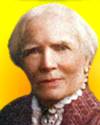 | Elizabeth Blackwell (1821-1910) was an Anglo-American physician. She was rejected by all the major medical schools in the nation because of her sex. But when her application to Geneva Medical School was referred to the student body, they accepted with great hilarity thinking it was a spoof from a rival school. Once accepted, she worked with quiet determination, and turned aside the hostility of the professors, students, and townspeople. She earned her medical degree in 1849 What is notable about the fact that she earned an M.D. degree? |
| Events | |
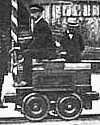 | On 31 May of a certain year, the world's first electric railway with an external power source was demonstrated by Siemens & Halske at the Berlin Trades Exposition. A third rail between the running rails supplied Power at 150 volts. A small electric tug locomotive pulled up to three flat cars with seats for passengers. In what decade was this first electric railway exhibited? |
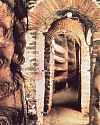 | In 1578, the Catacombs of Rome were discovered by accident when a chamber was opened by some laborers digging for pozzolana earth. Baronius the ecclesiastical historian was one of the first to visit the new discovery. Fifteen years later, 18-yr-old Antonio Bosio began a lifetime exploring the catacombs. Gradually he found links between them, for narrow passageways had been dug from one to another, excavated in the soft rock (tufa). What was the purpose of these subterranean passages? |
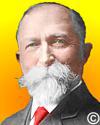 | In 1884, a U.S. patent application for “flaked cereal” was filed by its inventor. While trying to improve the vegetarian diet of his hospital patients, he investigated a digestible bread-substitute by the process of boiling wheat. He accidentally left a pot of boiled wheat to stand and become tempered. When it was put through a rolling process, each grain of wheat emerged as a large, thin flake. When the flakes were baked, they became crisp and light. With milk, this became a breakfast staple. Can you name this inventor? |
Fast answers for the previous newsletter for May 30: the decade including the year 1965 • plutonium • Baron Marcel Bich • the decade including the year 1942, under the stands of the abandoned Stagg football stadium at the University of Chicago. • hovercraft • riveted leather hose • kryton.
 If you enjoy this newsletter, the website, or wish to offer encouragement or ideas, please send feedback by using your mail reader Reply button.
If you enjoy this newsletter, the website, or wish to offer encouragement or ideas, please send feedback by using your mail reader Reply button. Your click on a Facebook, StumbleUpon, or other social button on the site webpages is also a welcome sign of appreciation. Thank you for using them.
© This newsletter is copyright 2020 by todayinsci.com. Please respect the Webmaster's wishes and do not put copies online of the Newsletter — or any Today in Science History webpage. (If you already have done so, please remove them. Thank you.) Offline use in education is encouraged such as a printout on a bulletin board, or projected for classroom viewing. Online, descriptive links to our pages are welcomed, as these will provide a reader with the most recent revisions, additions and/or corrections of a webpage. For any other copyright questions, please contact the Webmaster by using your mail reader Reply button.
--
If you do not want to receive any more newsletters, Unsubscribe
To update your preferences and to unsubscribe visit this link
Executive Real Estate Business Class
-
"It was like a man with wings. It wasn't like anything you'd see on TV or in a monster movie." ...
About the publisher
Search This Blog
Blog Archive
-
▼
2021
(585)
-
▼
May
(62)
- Tonight: Back-to-Back Premieres
- On This Day for May 31 - Adolf Eichmann hanged, Cl...
- Newsletter for Monday 31 May.
- On This Day for May 30 - Joan of Arc burned at the...
- TONIGHT at 8/7c: The Tulsa Race Massacre Revealed
- Newsletter for Sunday 30 May.
- Bundle Up For The Summer!
- On This Day for May 29 - Mount Everest summit reac...
- Newsletter for Saturday 29 May.
- On This Day for May 28 - Amnesty International fou...
- Newsletter for Friday 28 May.
- On This Day for May 27 - Founding of St. Petersbur...
- Newsletter for Thursday 27 May.
- On This Day for May 26 - Martin Luther declared a ...
- Newsletter for Wednesday 26 May.
- On This Day for May 25 - U.S. Constitutional Conve...
- Newsletter for Tuesday 25 May.
- Behind Every Empire There’s a Titan
- On This Day for May 24 - Opening of the Brooklyn B...
- On This Day for May 23 - Tibet annexed by China, C...
- Newsletter for Sunday 23 May.
- The Tulsa Race Massacre, 100 Years Later
- On This Day for May 22 - Roman Emperor Constantine...
- Newsletter for Saturday 22 May.
- On This Day for May 21 - First nonstop solo transa...
- Newsletter for Friday 21 May.
- On This Day for May 20 - U.S. Homestead Act signed...
- Newsletter for Thursday 20 May.
- On This Day for May 19 - Ringling Bros. Circus for...
- Newsletter for Wednesday 19 May.
- Learning This Fun Doesn't Need A Summer Break
- On This Day for May 18 - Eruption of Mount St. Hel...
- Newsletter for Tuesday 18 May.
- On This Day for May 17 - School segregation outlaw...
- Newsletter for Monday 17 May.
- Follow the trail of 400 facts!
- On This Day for May 16 - Warsaw Ghetto Uprising su...
- Newsletter for Sunday 16 May.
- On This Day for May 15 - Edith Cresson appointed F...
- Newsletter for Saturday 15 May.
- On This Day for May 14 - Declaration of Israel's s...
- Newsletter for Friday 14 May.
- On This Day for May 13 - U.S. declaration of war o...
- Newsletter for Thursday 13 May.
- Ridiculous History You Want To Know About!
- On This Day for May 12 - First flight over the Nor...
- Newsletter for Wednesday 12 May.
- On This Day for May 11 - “New Rome” established by...
- Newsletter for Tuesday 11 May.
- On This Day for May 10 - Nelson Mandela inaugurate...
- Newsletter for Monday 10 May.
- On This Day for May 9 - Fourth and final voyage of...
- On This Day for May 7 - Theatre Royal opened, Pyot...
- On This Day for May 5 - Mexican victory in the Bat...
- On This Day for May 4 - Four students shot at Kent...
- On This Day for May 3 - Margaret Thatcher elected ...
- Newsletter for Monday 3 May.
- TONIGHT: The Bin Laden Raid, Revealed
- On This Day for May 2 - Lou Gehrig's 2,130-game st...
- Newsletter for Sunday 2 May.
- On This Day for May 1 - May Day founded, Arthur We...
- Newsletter for Saturday 1 May.
-
▼
May
(62)
-
Blogroll
-
About
HistoryFact










0 comments:
Post a Comment